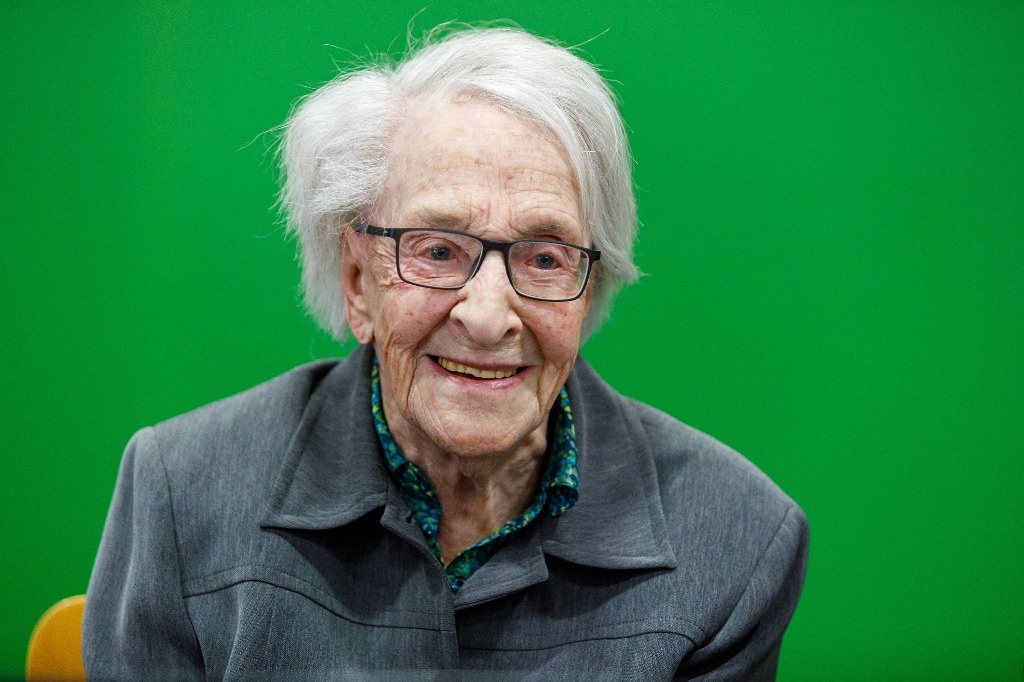The famous centenarian poet Ida Vitale (Montevideo, 1923) was the protagonist of a magical moment at the International University Book Fair (Filuni).
During the opening talk Once upon a time there was a forest of words
shared his vision of literature and life with more than 200 attendees: There is nothing more tempting than a limit
he said, which sparked a wave of reflections and applause among the spectators.
Recognized as one of the most important figures in Spanish-language literature, the Uruguayan author expressed her preference for prose over poetry, despite being better known for the latter.
Prose is what matters most to me in the world. I get along more or less well with poetry, but prose, with all the difficulties it poses for me, is everything. Poetry is a matter of rhythm, of good or bad taste.
With these words, Vitale revealed his profound respect for the complexity of narrative and its ability to capture human experience.
In a reflective tone, he shared his perception of the literary legacy that everyone leaves behind: I think we all go through the world destined to be a little cube of prose that stays there forever.
These words echoed in the packed Clementina Díaz and Ovando hall.
The writer spoke fondly of her years in Mexico, where she arrived in 1974, fleeing the military dictatorship in Uruguay. In her speech, she reflected her appreciation for the country’s rich cultural tradition and the impact it had on her life and work.
What one has done matters little. I care about recovering very happy years, not only because I was leaving a country that was not in very good political conditions, but because I came to discover a wonder that had been paved for me. They brought me closer to that luxury that is Mexican literature.
Winner of the 2018 Cervantes Prize, the author of The light of this memory (1949) compared the literary history of his native country with the national narrative.
Uruguay was like a small country where it was known that our history was short, neat, clean and well cared for. Mexico was everything: it had two histories, the literal one and another that suddenly does not appear organized in books, but which is basic and is the one we suddenly assimilate on our own when we discover an extraordinary power, a poetry, a luxurious prose or a surprising cultural history.
Centenarian writer Ida Vitale spoke fondly of her years in Mexico, where she arrived in 1974, fleeing the military dictatorship in Uruguay. Photo Pablo Ramos
Ida Vitale appeared 20 minutes before the scheduled midday meeting and lit up the room with her presence. The visitors, eager to see her, burst into applause and cheers.
Most people were looking for a souvenir photo, others wanted to shake her hand, hear her voice, or simply see her smile. The author, always cheerful, made those present laugh on several occasions, especially when she joked about the little signs placed in front of her: Ah, it’s so you know who we are.
.
He also shared anecdotes from his life and his literary training, as well as the influence of notable teachers such as Carlos Sabater Casti, although he admitted that in his youth he did not like the works of Juan Zorrilla de San Martín because he preferred poetry more at hand
.
The most significant moment was when he exclaimed: Chance has great importance in life
and began to read fragments of his poems, among them This world
, Daily obligations
y Expectant words
In an unexpected gesture, the translator and essayist also took off her glasses to read, which showed that, although the years pass, her literary vision remains fresh and clear.
In my family (of Italian origin) they were a bit old-fashioned. There I discovered that poetry could have its own merit and did not depend on imposed music.
he recalled.
Ida Vitale concluded her participation with advice to mothers of children at the age of being spoiled
: I suggest that you let them read, even if it is things that are not suitable for them. I think that there is nothing more necessary than reading things that one does not understand. Sometimes it is intuited that one should not ask; children are not so stupid, because they know when there are boundaries, for that reason one should not prohibit them from reading anything.
.
She also recalled how she herself was drawn to Gabriela Mistral’s first poem precisely because she did not understand it, but felt that it marked a boundary that she needed to explore…
The poet spoke with her colleague Luis García Montero, recently awarded the Carlos Fuentes International Prize for Literary Creation in the Spanish Language, who defined her as a prolific author who took refuge in Mexico, in whose cultural life she has participated for decades.
Rosa Beltrán, coordinator of Cultural Diffusion at UNAM, who was the presenter of the meeting, highlighted the poet’s wisdom and her dedication to literature.
“Not everyone reaches that age, with that level of wisdom and with that sense of purpose that they give to their days. That is a great life lesson. Our dear Ida came from Uruguay and despite the bumpy details of the road, her actions denote ethical will. From the moment we invited her, she said: ‘I’m going to Mexico’.”
#Ida #Vitale #UNAM
– 2024-08-28 20:58:50
